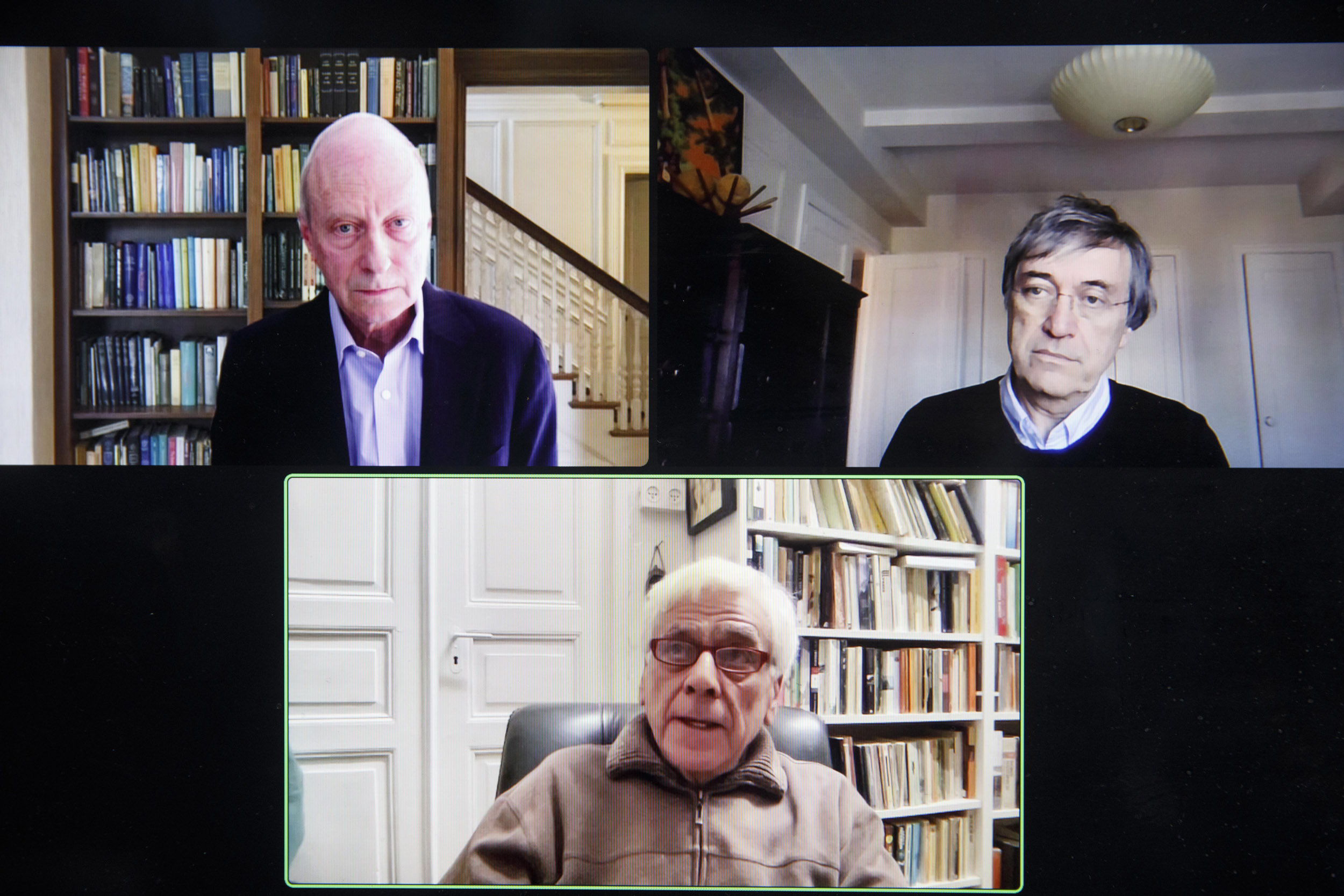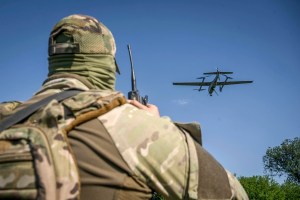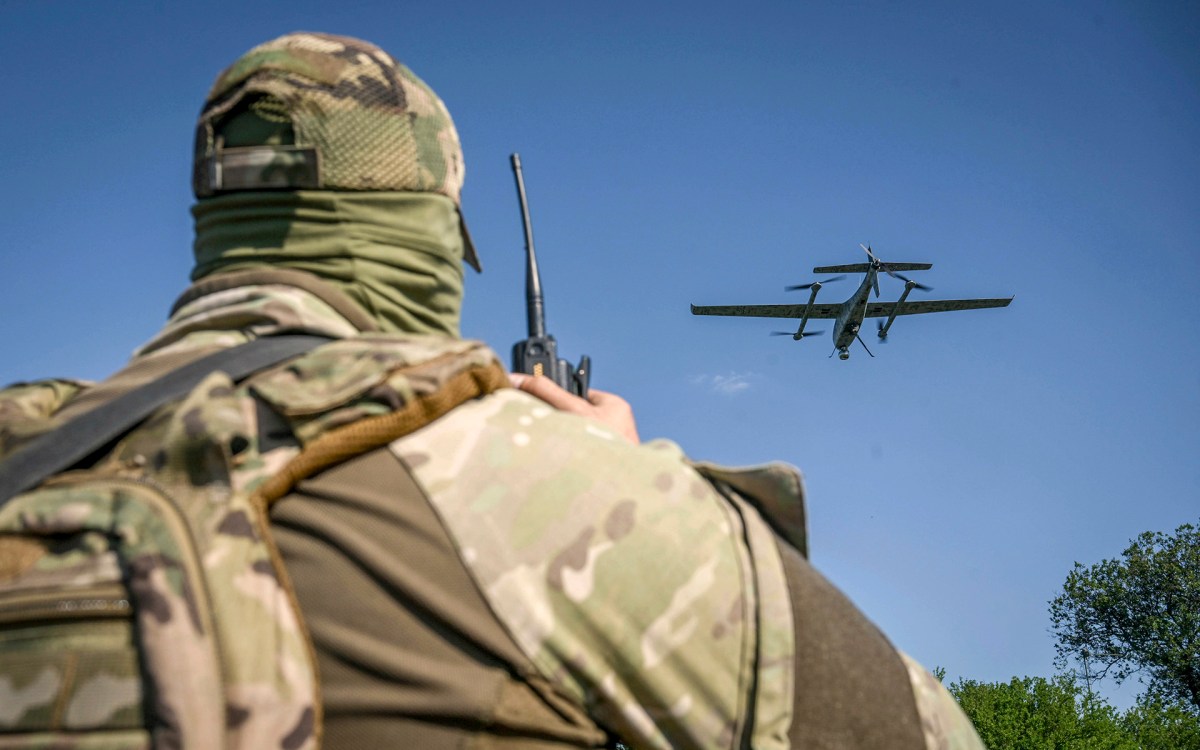
Michael Sandel (clockwise from top left) moderated a discussion between Israeli and Palestinian philosophers Moshe Halbertal and Sari Nusseibeh.
Kris Snibbe/Harvard Staff Photographer
‘What we really need is just to sit together and face each other’
Israeli, Palestinian philosophers exchange tales of personal loss, find points of contention, agreement over war
Open, honest, and respectful conversation remains the best hope for finding common ground on the Middle East. That was the takeaway from the fourth installment in the Weatherhead Center’s “The War in Israel/Gaza” series, which featured a pair of Israeli and Palestinian philosophers in a dialogue moderated by Michael Sandel.
At the top of Friday’s virtual event, both academics articulated a sense of personal crisis.
Moshe Halbertal, the Gruss Professor of Law at New York University School of Law and John and Golda Cohen Professor of Jewish Thought and Philosophy at Hebrew University of Jerusalem, cited the trauma and “sense of fragility” felt in Israel following the Hamas surprise attack on Oct. 7. He also expressed anguish over “sensing a strong delegitimization of the very existence of Israel” from “people whom I thought were partners.”
“In moments of pessimism, I try to come back to my basic convictions,” Halbertal said. “My basic conviction is there is no other solution but a two-state solution. There should be a Jewish nation-state side by side with a Palestinian nation-state. Our self-determination will be justified only if there is a Palestinian self-determination.”
Former Al Quds University president Sari Nusseibeh, now an emeritus professor of philosophy, said that he felt a loss of the kind of optimism that once fueled his work as a Jerusalem representative with the Palestinian Authority, the governing body of the West Bank.
“It seemed to me there was enough sanity on both sides to continue negotiating,” Nusseibeh said. “But in the last four months, I’ve been totally thrown out of that mode of thinking.”
Sandel, the Anne T. and Robert M. Bass Professor of Government, characterized the discussion as an exchange between old friends from Jerusalem. The audience learned of the pair’s frequent interactions during the 1990s Oslo peace process, with Nusseibeh reminiscing further about a pleasant gathering at Halbertal’s home.
Halbertal and Nusseibeh spoke of losing loved ones on or after Oct. 7. Halbertal remembered “a very close student who was murdered with his son” by Hamas. Nusseibeh was more oblique in referencing a “terrible” situation involving cousins on his mother’s side.
“It makes me think irrationally to bring it up,” he shared.
Beyond their shared personal tragedies, Nusseibeh joined Halbertal in condemning Hamas’ invasion, calling recent events “including first and foremost the seventh of October itself” examples of senseless brutality. He also endorsed Halbertal’s views on the two-state solution, calling it the most practical of all proposals.
“But we’ve worked on a two-state solution for so many years,” said Nusseibeh, whose family has roots in Jerusalem going back 13 centuries. “It failed, but it can be tried again — it should be tried again.”
Likewise, both deeply opposed Israel’s occupation of Palestinian territories in the West Bank and Gaza. “I’m against the occupation as an act of force,” said Halbertal, who was born in South America to a Holocaust survivor father before the family moved to Jerusalem. “The occupation is wrong, and I hope it can end peacefully.”
Discussion of just warfare — whether a military action can be morally justified — surfaced disagreement when Sandel asked both men: “Is Israel’s war in Gaza a just war?”
Halbertal explained that, as he saw it, the Oct. 7 attacks were not about resisting the occupation. “Hamas, since its dominant role in the ’90s … has done everything to harm the possibility of a peaceful solution,” he said.
Confronting the militant group was necessary, Halbertal continued, since Israel is obligated to protect citizens from further violence. “The only justification of war — if there is any — is defense,” he said. “Then there is another question the philosopher asks, which is not the justice of the war but the justice in the conduct in the war. That’s a different question.”
“And what would be your answer to that second question?” Sandel pressed.
“Clearly, it’s not an indiscriminate, intentional attack on civilians, which is the worst thing a country can do,” Halbertal replied. “It’s an attempt to harm Hamas.”
But he acknowledged the cost to Gazans at large is “so big, so painful.”
“You have to ask yourself, ‘How do I end it in a way that would relieve the civilians … given the legitimate aims that are there?’ And then, ‘How do I reconstruct life?’”
In that respect, Halbertal concluded, Israel’s actions will also be “assessed by what happens after the war.”
Nusseibeh responded by noting himself “suspicious” of such thinking. Palestinians see forceful occupation as inseparable from Israel, he said, just as Israelis may see civilian deaths in Gaza as inseparable from Hamas.
“You can’t just justify one kind of self-defense at the expense of another,” he argued. “That’s why this language, to my mind, is unconvincing and can lead a lot of people astray from what needs to be done. And what we really need is just to sit together and face each other and find other ways to resolve our problems.”




